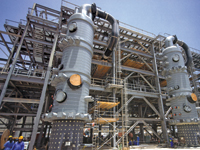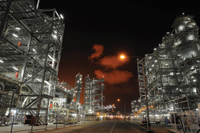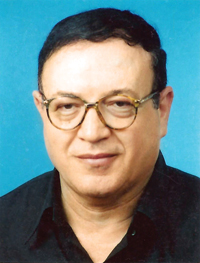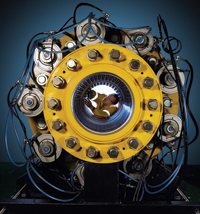
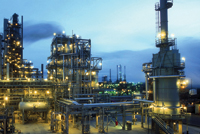 Conoco ... eyeing cooperation with Qatar
Conoco ... eyeing cooperation with Qatar
QATAR has held talks with ConocoPhillips on ways to enhance business activities between its national oil company and the US independent and their existing joint initiatives, Qatar Petroleum says in a statement.
The meeting in Doha was attended by energy and industry minister Dr Mohammed Al Sada, who is also chairman of Qatar Petroleum, and ConocoPhillips chairman and CEO Ryan Lance, the state-owned company says.
Qatar Petroleum did not elaborate further on the nature of the talks. However, Qatar is at a turning point in the development of its vast natural gas resources and is seeking to accelerate the expansion of its gas-based petrochemicals and fertiliser sector while holding LNG production capacity steady.
ConocoPhillips has a 30 per cent stake in the 7.8 million tonnes per year Qatargas 3 LNG production joint venture, in which Qatar Petroleum holds 68.5 per cent and Japan’s Mitsui 1.5 per cent.
A description of the project on ConocoPhillips ‘ website states that peak production from Qatargas 3 was achieved in 2011 and is expected to continue for the 25-year life of the project.
ConocoPhillips also has its Global Water Sustainability Center located in Qatar, at the Qatar Science and Technology Park in Doha.
Despite the estimated 900 trillion cubic feet (tcf) of gas reserves in its offshore North Field, which has established the Gulf emirate as holder of the world’s third-largest gas reserves after Russia and Iran, Qatar has continued to pursue upstream gas exploration. On March 10, Qatar Petroleum and Germany’s Wintershall announced a significant offshore discovery containing an estimated 2.4 tcf of gas reserves.
Amid heightened political tensions in the Gulf region, especially between Iran and Qatar ‘s larger Arab neighbour, Saudi Arabia, Qatar has placed an indefinite moratorium on further North Field development. Dr Al Sada says that the moratorium would remain in place.
The North Field is Qatar’s side of the world’s largest conventional non-associated gas deposit, which it shares with Iran. The Iranians call their side of the massive reservoir South Pars and estimate that it contains 500 tcf of reserves, or roughly half the country’s total gas reserves.
While Qatar’s intensive development of North Field production, up until 2010, has enabled the emirate to become the world’s leading LNG exporter – a position it has held since 2008 – Iran’s efforts to develop South Pars have lagged behind. Tehran has expressed concerns that Qatari North Field gas production could deplete Iran’s South Pars reserves, a contention that some of Qatar Petroleum’s international oil company partners dispute.
Qatar’s moratorium on further North Field development, beyond what had been planned until the end of 2010, was imposed in 2005, ostensibly to allow the emirate to conduct a detailed study of North Field reservoir structure.
Publication of the study’s findings would have helped resolve questions about whether gas was migrating from South Pars to North Field.







































































